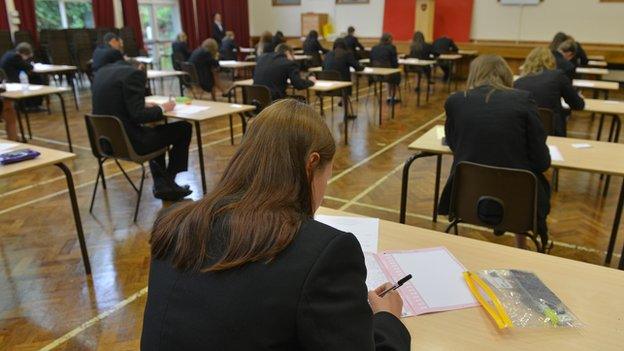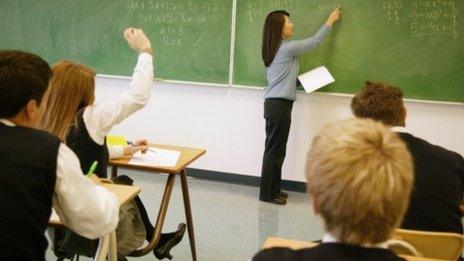New maths GCSEs too hard, says exams regulator
- Published

Teenagers will sit the new maths GCSEs in summer 2017
Exam boards have been told to re-write their new maths GCSE exams just six school weeks before pupils are due to start studying for them.
English exams regulator Ofqual analysed the results of 4,000 mock tests of sample papers for GCSEs due to be studied in schools next term.
It found three of the four main exam boards had made their papers too hard for the broad spread of candidates.
The fourth, AQA, has been ordered to make its papers more "challenging".
Exam boards have been drawing up new, tougher maths and English GCSEs in response to government demands to introduce more rigour into secondary school examinations.
'Too difficult'
One of the aims was to bring GCSE syllabuses and exams up to the level of high-performing nations like Singapore and South Korea.
Ofqual analysed test results and sample materials after concerns were raised about varying standards.
The analysis compared the difficulty of materials provided by OCR, Pearson, WJEC Eduqas and AQA by looking in detail at the papers and test results.
It found tests from OCR, Pearson and WJEC Eduqas would "fail to differentiate effectively across the full range of ability" for whom the qualification is intended.
"This is due to the assessments being too difficult."
In the case of Pearson and Eduqas, the papers were so hard that the grade A boundary would have to have been set at below 50%, Ofqual said.
The research showed that "even the students from the best performing schools scored poorly", adding: "The evidence suggests that if these assessments were live exams, they would not function well."
Chief exams regulator Glenys Stacey rejected suggestions that in demanding the changes now, just weeks before the end of the summer term, the regulators had left it too late.
'We'll act quickly'
She said: "What we are doing here is an unprecedented amount of analysis.
"This is not going back to the drawing board. This is going to happen in the next few days. This is not a substantial re-write by any means, it's making sure standards are right in a sufficient and even-handed way."
Ofqual had accredited all four GCSE syllabuses before concerns were raised by OCR and Pearson about the comparative ease of AQA papers last December.
AQA chief executive Andrew Hall said: "We're pleased that Ofqual has recognised that our qualification works properly as an assessment - allowing us to set reliable grade boundaries which will ensure that students get the results they deserve.
"Teachers can be absolutely confident that the approach we've taken all along is the right one. We're happy to make the small changes Ofqual has asked for - and we'll do this quickly so schools can get on with teaching in just a few months' time."
Chief executive of OCR board Mark Dawe said: "We appreciate Ofqual's determination to ensure that all awarding bodies' exams are of the same rigour. We also welcome the Regulator's commitment to enable new sample exam papers to be with schools and colleges from the end of June."
Ofqual have asked all awarding bodies to make changes to their sample materials, which we will be submitting to the regulator for approval by the end of the month.
Pearson chief executive Rod Bristow said: "As the new GCSE qualifications are introduced into schools for teaching, we will continue to work with the regulator and other exam boards to ensure a fair system for learners and clear information for teachers."
Gareth Pierce, chief executive of the WJEC board, said: "The overall research findings allow us to refine our sample assessments. In response to Ofqual's request , we will adjust some of our questions so that we move towards the middle ground in terms of relative difficulty, in the context of a similar expectation being made of all awarding bodies.
"We have already identified ways of making selected questions more accessible without changing our assessment style."
Russell Hobby, general secretary of the National Association of Head Teachers, said: "School leaders were rightly concerned that with half a term to go until the papers are in use there is less time available to consolidate teaching efforts.
"However, they will be reassured by the rigorous approach Ofqual has taken to addressing the concerns around the differences in difficulty between the different boards.
"Further reassurance comes from the intention to have revised materials available by the end of June. This exercise has had to be undertaken within a restricted time frame."
- Published23 January 2015
